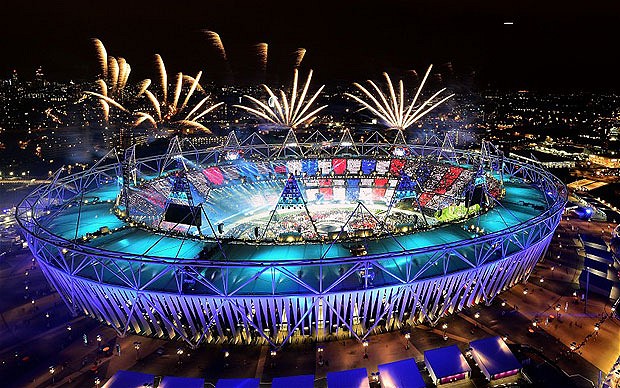
Richard: July 2012 sees the summer Olympic Games come to London. And a lot of people are really, really excited about this most global of events. But for this week's podcastsinenglish.com we're going to talk about a few areas of concern that have come up.
Jackie: Yes, four areas. What... which two are you going to talk about, Richard?
Richard: I've looked into the... the cost and the security.
Jackie: And I shall be talking about the legacy and the commercialism. Richard, the cost: it's gone up, hasn't it?
Richard: Yes. When London bidded in 2005, they said it would cost 2.4 billion pounds.
Jackie: Well, that's a lot to start with.
Richard: It seems a lot but now the latest estimate, Government estimate, they're saying it's going to cost the UK Government 9.3 billion pounds.
Jackie: So three times more expensive.
Richard: Yes. Interestingly, 9.3 billion pounds, approximately 15 billion dollars is the same amount as it cost Athens eight years ago. However, a lot of people are saying it's costing an awful lot more. There are a lot of associated costs which could put the bill up to 24 billion pounds.
Jackie: Now I know you're also talking about security because that has added to the cost, hasn't it?
Richard: Well, yes the security on a number of different issues. The border security um... they've employed an extra 500 border staff, but there's been a problem there because apparently the new border staff have been letting in terror suspects.
Jackie: Are you're talking about the border staff at the airports?
Richard: At the airports, yes. So that's a problem.
Jackie: So, they're not trained enough.
Richard: They're not trained enough. But never mind that, more recently there's been a big issue with the private contractor, G4S, who were supposed to um... contract 13,000 staff for security for the events at the Olympic games and apparently a lot of these people, they haven't showed up for work.
Jackie: Right, so they've... they have actually recruited all of these people, you're not... no?
Richard: They haven't recruited all of them, they need to recruit more so therefore um... the UK government has had to bring in an extra three and a half thousand troops, soldiers, to do their job.
Jackie: And they'll charge of course, you see.
Richard: Exactly. So the security is going to be a huge cost. Paying for them and also extra police as well.
Jackie: And I know that people are unhappy about um... those... those people living in flats near... near the Olympic Park who have missiles on their roofs.
Richard: Yes um... as an extra security issue they've placed six um... ground to air missile batteries on the top of some big buildings in London including um... residential flats.
Jackie: Well, I think that leads nicely into the legacy actually Richard because the Olympic Stadium, the Olympic Park, is based in the East End of London which is, traditionally, a hard-up area, it's a poorer area of London and one of the things that they said was, we will regenerate this area. There is a new um... shopping mall in the area, and there's a new railway line.
Richard: The biggest shopping mall in Europe, I believe.
Jackie: However, the Olympic Park or the Olympic Village which has accommodation initially that was going to go as much as possible to local people at affordable rates.
Richard: For people to live in?
Jackie: Exactly. But they say that yes, some of those flats will go to local people at 80% of the market rate but in the East End of London even a reduction of 20% of the local... of the average rent is not affordable.
Richard: Not affordable by the local people yes, so you're going to get the rich bankers and what have you moving in, aren't you?
Jackie: They said that the East End of London would also benefit um... during the Olympics as well. And one of the things that had been agreed was that the marathon would go through that area, and now it's been re-routed in favour of the wealthy West End.
Richard: So why is that, then?
Jackie: Because apparently the sponsors, they say they want a backdrop of Buckingham Palace and St. Paul's Cathedral.
Richard: Right. So commercialism again coming to the fore: money talks.
Jackie: Exactly
Richard: So who are the main sponsors then?
Jackie: Well good question, Richard: Coca Cola and McDonald's.
Richard: [laughs] So a sports event being sponsored by fizzy drinks and junk food.
Jackie: Exactly. McDonald's have built the largest McDonald's restaurant in the world in... just outside the Olympic Stadium.
Richard: Wow
Jackie: And again one... linked to the legacy they said that...
Richard: Linked to the legacy that means that the East End gets the world's biggest Big Mac store.
Jackie: No, they're knocking it down.
Richard: Oh, really?
Jackie: Yes, it's not going to stay there, it's not going to stay there. London won the right to host the 2012 games with the promise to deliver a legacy on more active, healthy children. How then can their top sponsors be fast food companies?
Richard: Right. So there are a few problems um... with... to do with these Olympics, however, having said that we are sure it's going to be a fantastic sporting event.
Jackie: As long as it doesn't rain.
Richard: [laughs] That's another matter completely!